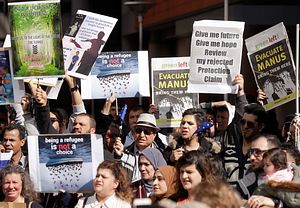This is not just about Australia. This is about a new world that we are seeing come into being before our eyes. A world in which the defense of borders depends on the drawing of new lines between the included and the excluded, between citizens and their lives. But these are very dangerous times, for what is being redrawn here are the limits of our human community and the very fragility of those shifting lines means that one day any one of us might find ourselves on the outside.
These were the reflections of Hoda Afsha about Australia’s contemporary border protection policies upon winning the Bowness Photography Prize in 2018 for her image of Kurdish writer, scholar, and recognized refugee Behrouz Boochani, still imprisoned in Australian immigration detention.
Australia is the only country that mandates immigration detention for all “unlawful” arrivals, including those seeking protection as refugees. Australia has had one of the most punitive policies on forced migration in the world, including controls beyond the border; the current U.S. practice of caging “illegal” migrants comes close. But a key distinction is that Australia effectively punishes those who flee to the country for protection.
The harsh conditions in detention to which “unlawful” refugees are subjected have been touted by successive Australian governments as a crucial plank of its border security policy. Widespread public support for a punitive detention regime has been driven by a dominant perception since the 1980s that those arriving by boat are either “bogus” refugees – attempting “easy” entry into Australia for economic gain – or that they constitute a security threat. These perceptions are discounted by the reality that most applications for refugee status by “boat arrivals” are approved, with a very high percentage of successful appeals against adverse decisions. Yet there is persistent evidence of ongoing public support for tough border protection coupled with minimal concern about Australia’s reputational damage as a signatory to the Refugee Convention. Unfortunately these views are typically based on misperceptions about refugee movement, fuelled by negative media and government campaigns.
Australia’s newly re-elected Federal Liberal government has claimed that the dramatic fall in the number of refugees arriving “illegally” – colloquially termed “boat arrivals” – illustrates the success of its harsh border protection measures. Returned Prime Minister Scott Morrisonis keen to declare: “I stopped the boats.” Aside from the questionable truth of this claim – government operations under “Operation Sovereign Borders” are subject to intense secrecy – the bigger question is: At what cost? And what is the likely trajectory of border protection under the newly re-elected Morrison government? Given the extent of public support for its position on border control, this has repercussions for Australia’s regional relationships, for human rights protections, and for the principles embedded in the newly developed Global Compact for Safe, Orderly and Regular Migration as well as for the UN’s Global Compact on Refugees.

































